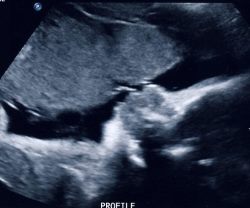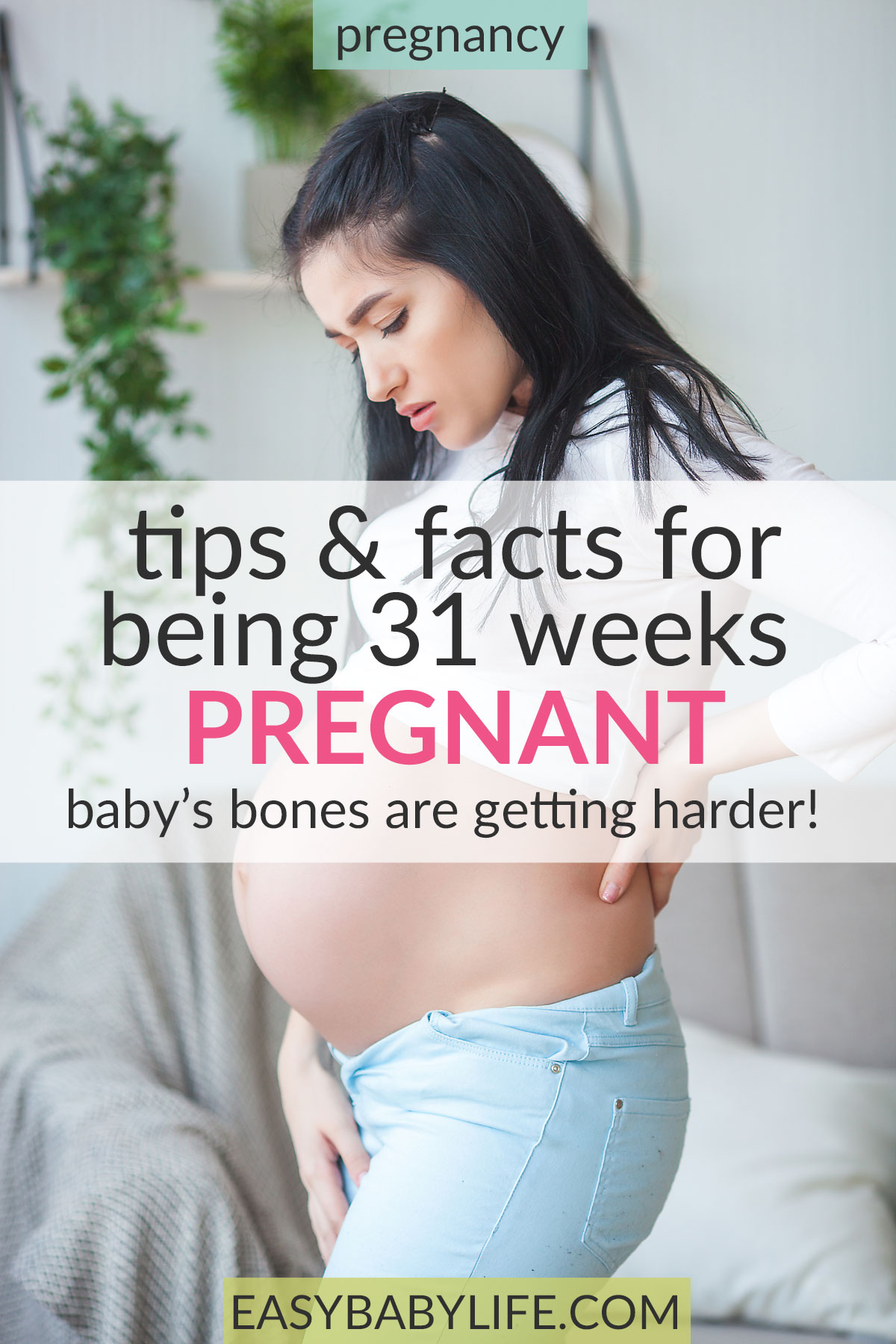When you are 31 weeks pregnant, your baby is growing and growing and is now about the same length as from your elbow to your fingertip.
It is time to start preparing for giving birth. A common worry among pregnant women is how they are going to cope with labor pain. In addition to various pain relief methods, understanding what the labor pain is really about, may help to mitigate your worries.
Week 30 | Week 32
What to Expect When 31 Weeks Pregnant
In this article:
How many months is 31 Weeks Pregnant?
At 31 weeks, you are in month 7 of pregnancy and the third trimester. Only two more months to go. This is the last week of the seventh month, and soon you’ll be pregnant for the full seven months and enter month 8.
Because of the confusion that often happens with counting pregnancy weeks and months, we wrote a short guide to help you understand it.
Your Baby at 31 Weeks
How Big is my Baby at 31 Weeks?
The fetal age of your baby is now 29 weeks. Your baby measures around 3.3 pounds (1.5 kg) – that’s around four navel oranges. The baby is now around 16 inches (40.6 cm) long, similar to the distance between your fingertip and your elbow. At 31 weeks, your baby is the size of a coconut.
If born now, the baby would still need a bit more help and medical care. However, at 31 weeks, the survival rate is up to 99%.
What Does my Baby Look Like at 31 Weeks Pregnant?
The legs and the body are starting to round up as more fats accumulate under the skin. Your little one is getting plumper every day.
Some babies are already positioned head down at this point, which is the optimal position for birth. However, if your baby still hasn’t rotated in the head-down position, don’t worry, there is still time and room for it.
Fetal development
 PinYour baby now has the ability to turn the head from side to side.
PinYour baby now has the ability to turn the head from side to side.
You may also notice that your baby is moving a lot, causing you to sleep less. Take this positively. It only means that you have an active and healthy baby inside your womb.
The brain develops rapidly and is expected to function well since there are already billions of neurons present. And your baby can now make use of all five senses since the connections between the individual nerve cells are now becoming more developed. You may be wondering if all of the senses will be used while the baby is still inside. Well, your baby can’t smell anything yet since she is surrounded by amniotic fluid. But one thing for sure is true –the sense of smell is now developed, though it is not being used yet.
Your little one can now make faces, swallow, hiccup, and pedal her hands and feet inside your womb. While still inside the womb, some babies even suck their thumb vigorously.
According to research, at 31 weeks, the baby can slowly blink, approximately 6 to 15 times an hour.
Make sure you have sufficient calcium, folic acid, protein, and iron in your diet. It is necessary at this stage since your baby’s bones become harder.
Mom’s Body When 31 Weeks Pregnant
The Belly
Your belly is growing and makes it harder for you to see your feet, tie your shoes, and pick up things off the floor. You might have also started to waddle when walking.
With the due date approaching, there will be less space for your baby to do somersaults and kick hard, but you must feel your baby’s movements until birth. Your baby moving means she is well and healthy. If at any point you feel your baby is moving less or not moving at all, contact your doctor.
Pregnancy Symptoms
 Pin31 weeks pregnant, you can expect frequent abdominal aches as your uterus is continuing to stretch to accommodate your growing baby. At this time, your uterus will be about 4 1/2 inches above your navel. Not very comfortable!
Pin31 weeks pregnant, you can expect frequent abdominal aches as your uterus is continuing to stretch to accommodate your growing baby. At this time, your uterus will be about 4 1/2 inches above your navel. Not very comfortable!
The growing uterus is also pushing against your bladder, which results in a need for frequent urination.
You may also notice that your uterine muscles are tightening now and then – contractions! They are actually most likely so-called Braxton Hicks contractions, and they would occur more frequently compared to the last few weeks. The contraction often lasts about 30 seconds. Don’t worry; they are just false contractions, and they are normal and painless.
Keep in mind that these contractions occur at irregular intervals and remain irregular. They can be felt in the abdomen, remain in the abdomen and groin, and disappear with rest and sleep.
If you experience contractions other than the ones described (for example, painful, regular, or contractions that don’t disappear), then you better go to your health care provider for you may be showing signs of preterm labor.
During the third trimester, you might notice more vaginal discharge. At some point, you might feel a fluid leaking and be unsure whether it is urine, amniotic fluid, or vaginal discharge. Urine usually has an odor, while the amniotic fluid will usually be odorless and clear, although it may sometimes contain traces of blood or mucus. Vaginal discharge usually has a mild smell and looks milky, and is white or yellow in color.
If the flow is heavy enough to soak through your panty liners, or if you are unsure whether the leaking is normal, call your doctor.
By this time, you may expect some milk leaking from your breasts. This fluid is called colostrum or “pre-milk.” It is the first stage of breast milk that will last for a few days after the baby’s birth. It’s normal since you are in the stage of milk production in preparation for the coming baby. No matter if you leak colostrum during pregnancy or not, it is considered normal.
You can use a nursing bra and insert nursing pads to protect your clothes. Just don’t head off and buy a full year’s supply of nursing bras already. Read our tips for buying the right nursing bra here.
Just like the past weeks, you will still be feeling some shortness of breath since your uterus is continuing to push all your internal organs, giving less space for your lungs to expand. So, to avoid getting exhausted, you need to rest in between periods of activities or exercise, and you need to have plenty of bed rest.
You also need to inhale and exhale deeply several times a day. This will help expand your lungs and get enough oxygen needed for both you and your baby.
Don’t worry, these episodes of shortness of breath will end when the baby descends to your pelvis – that’s two to three weeks before your expected date of delivery, sometimes even earlier if it is your first child.
You are probably already very familiar with back pain. Your back muscles are doing extra work carrying the growing baby and the extra weight, and your spine is adapting to accommodate the baby. If you haven’t already, try doing some pregnancy yoga.
Sleep problems are a common complaint in the third trimester. Many women find it hard to fall asleep and to stay asleep too. Because of the growing belly, it is hard to find a good sleeping position. Even if you find one, leg cramps, hip pain, back pain, frequent urination, and even worries as the due date is approaching might keep you from getting a good night’s sleep.
It is advisable to sleep on your side, especially once you enter the third trimester. Research (see below under References) showed that sleeping on the back is related to the increased risk of stillbirth. It is particularly advisable to try and sleep on your left side. This position allows for more nutrients and blood to reach the placenta and the baby. It also helps the kidneys to get rid of waste products and fluids from your body.
Although it can occur at any time, preeclampsia is more likely to develop in later stages of pregnancy. Some of the preeclampsia symptoms are high blood pressure, persistent and severe headaches, changes in vision, and severe swelling, particularly in your hands and face. If you notice any of these signs, talk to your doctor about it.
Things to do and buy this week
Have you started to plan for the Big Event, due in about 8 or 9 weeks or so? If not, check out or articles about giving birth here.
If you haven’t already, it is also advisable to learn about the signs of preterm labor. Just in case it happens at this point, it will be good for you to recognize it and know what to do.
If you are considering traveling at this point, it is best to talk to your doctor about it first.
Get immediate expert help with your pregnancy questions through JustAnswer Pregnancy:Week 31 Pregnancy Video
Diary of a Daughter
What’s it really like being 31 weeks pregnant…? Here’s a true diary from a 31 weeks pregnant mom (Me..!)
Christmas passed without me giving birth! Tjihoo!
According to my midwife, my iron has improved, and I can feel it, too; not quite as tired. The contractions are not quite as bad either. :-)
Are you also 31 weeks pregnant? Please share your experiences and thoughts by leaving a comment below!
Read Next
- Premature survival rates week by week
- All about Braxton Hicks contractions
- Childbirth videos that are helpful (even when you’re pregnant)
Week 30 | Week 32
References:
- Association between maternal sleep practices and late stillbirth – findings from a stillbirth case-control study
- Preeclampsia symptoms and causes
- Mayo Clinic, Mayo Clinic Guide to a Healthy Pregnancy
- Joanne Stone MD and Keith Eddleman MD, The Pregnancy Bible: Your Complete Guide to Pregnancy and Early Parenthood
- Nilsson, L; Hamberger, L. A Child Is Born
- Soderberg, L., Mammapraktika. B Wahlstroms.
Image 2: Image of 31 weeks belly by Graham and Shiela

Paula Dennholt founded Easy Baby Life in 2006 and has been a passionate parenting and pregnancy writer since then. Her parenting approach and writing are based on studies in cognitive-behavioral models and therapy for children and her experience as a mother and stepmother. Life as a parent has convinced her of how crucial it is to put relationships before rules. She strongly believes in positive parenting and a science-based approach.
Paula cooperates with a team of pediatricians who assist in reviewing and writing articles.








